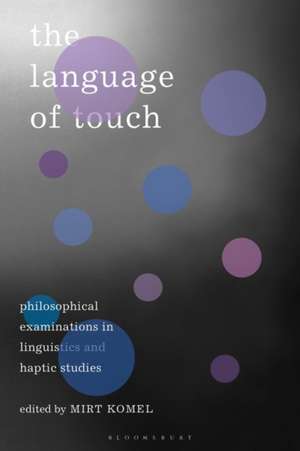The Language of Touch: Philosophical Examinations in Linguistics and Haptic Studies
Editat de Dr Mirt Komelen Limba Engleză Paperback – 22 iul 2020
| Toate formatele și edițiile | Preț | Express |
|---|---|---|
| Paperback (1) | 223.20 lei 43-57 zile | |
| Bloomsbury Publishing – 22 iul 2020 | 223.20 lei 43-57 zile | |
| Hardback (1) | 772.17 lei 43-57 zile | |
| Bloomsbury Publishing – 9 ian 2019 | 772.17 lei 43-57 zile |
Preț: 223.20 lei
Preț vechi: 288.09 lei
-23% Nou
Puncte Express: 335
Preț estimativ în valută:
42.72€ • 46.42$ • 35.91£
42.72€ • 46.42$ • 35.91£
Carte tipărită la comandă
Livrare economică 21 aprilie-05 mai
Preluare comenzi: 021 569.72.76
Specificații
ISBN-13: 9781350175624
ISBN-10: 1350175625
Pagini: 208
Dimensiuni: 156 x 234 mm
Greutate: 0.3 kg
Editura: Bloomsbury Publishing
Colecția Bloomsbury Academic
Locul publicării:London, United Kingdom
ISBN-10: 1350175625
Pagini: 208
Dimensiuni: 156 x 234 mm
Greutate: 0.3 kg
Editura: Bloomsbury Publishing
Colecția Bloomsbury Academic
Locul publicării:London, United Kingdom
Caracteristici
Offers a brand new approach to haptic studies, itself an area of growing interest exploring the ways in which people communicate and interact via the sense of touch, which examines the intersection of phenomenology, Marxism and poststructural linguistics
Notă biografică
Mirt Komel is Assistant Professor, Researcher and Chair of the Department of Cultural Studies at the University of Ljubljana, Slovenia.
Cuprins
Introduction, Mirt Komel (University of Ljubljana, Slovenia)1. The Wave of the Sign: Pyramidal Sign, Haptic Hieroglyphs, and the Touch of Language, Mirt Komel (University of Ljubljana, Slovenia)2. The Structure of the Phonetical Touch: Unsettling the Mastery of Phonology Over Phonetics, Tomi Bartole (University of St. Andrews, UK)3. Surplus of Touch: From the Forest of Symbols to the Jungle of Touch, Karmen Sterk (University of Ljubljana, Slovenia)4. Ontology of Touch: From Aristotle to Brentano, Gregor Moder (University of Ljubljana, Slovenia)5. Anatomical Aporia: Speculative Unity of Touch and Language, Goran Vranesevic (University of Ljubljana, Slovenia)6. The Category of the (Un)Touchable in Haptic Materialism: Touch, Repetition, and Language, Bara Kolenc (University of Ljubljana, Slovenia)7. The Lick of the Mother Tongue: Derrida's Fantasies of 'the Touch of Language' with Augustine and Marx, Rachel Aumiller (University of Hamburg, Germany)8. On the Touch of Swear Words: Swearing and the Lacanian Real, Peter Klepec9. Proper Names: Being in Touch with the Real, Jela Krecic-Zizek (University of Ljubljana, Slovenia)10. Ethics of Touch: Doctor Who's Untouchable Touch, Eva Vrtacic (University of Ljubljana, Slovenia)11. Screaming Contagions: The Scream as Haptic Contagion, Zack SieversIndex
Recenzii
The sense of touch has always been relegated to the second rank by the philosophical and cultural tradition, lagging far behind the more elevated senses of vision and hearing. Tides have changed with the path-breaking work particularly by Jean-Luc Nancy, Derrida and some others, but the proper 'haptic turn', in the echo of and in counterpoint to the decried 'linguistic turn', still has to be carried out and seen through. The present volume, bringing together the incisive and insightful research of a group of young Slovene theorists (including some 'honorary Slovenes'), proposes a new and original take on one of the oldest questions: how do words touch things and how does touch inform and affect language? Haptolinguistics may well be the word that we will have to add to our vocabulary.
An intriguing and thought-provoking collection of essays. These compelling and original reflections invite us to think about language and the vicissitudes of matter in new and startling ways.
An intriguing and thought-provoking collection of essays. These compelling and original reflections invite us to think about language and the vicissitudes of matter in new and startling ways.
